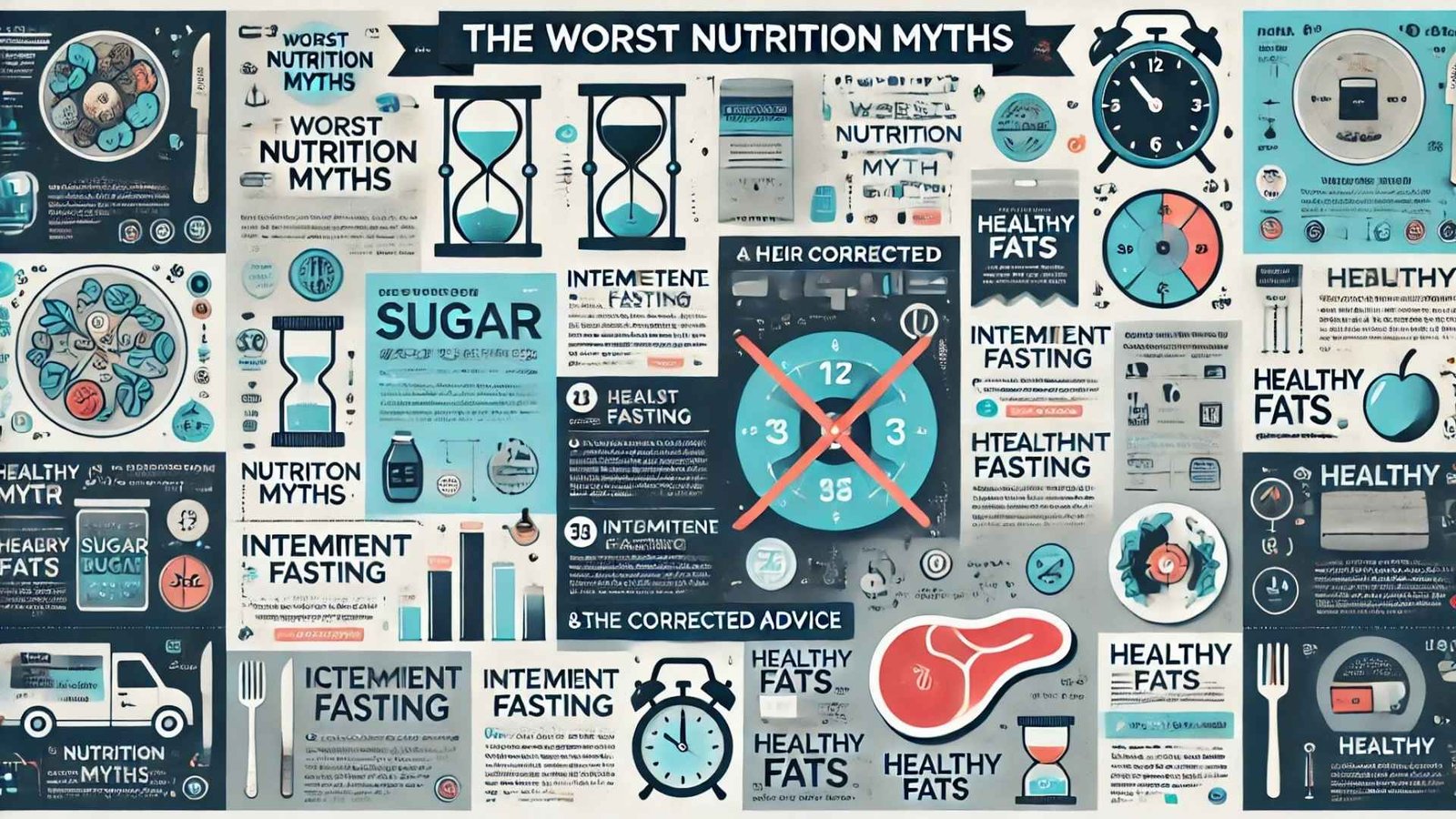You’ve Been Lied To About Your Diet—Let’s Set the Record Straight
If you’ve ever followed traditional diet advice—eat less, move more, snack frequently, avoid fat—you might have wondered why it never really worked. You’re not alone.
A lot of the nutrition advice we’ve been given over the years is outdated, misleading, or even flat-out wrong. Some of it has been pushed by food companies with their own agendas, while other myths have been repeated so often that they’ve become “fact.”
But today, we’re busting these lies wide open. Let’s break down the worst nutrition advice that’s still out there and what you should actually do instead.
Myth #1: You Can Get All Your Nutrients from Food
Why This Advice Is Wrong:
Wouldn’t it be great if you could get everything your body needs just from food? In a perfect world, maybe. But the reality? Our modern food supply is a nutritional disaster.
- Soil depletion – The fruits and veggies we eat today have far fewer nutrients than they did 100 years ago. Thanks to over-farming, soil quality has been stripped of key minerals.
- Refined foods steal nutrients – Over 50% of the average diet comes from processed foods, which not only lack essential nutrients but also deplete your body’s stores.
- Medications block absorption – Common drugs like statins, metformin, and even antacids rob your body of vitamins like CoQ10, B12, and magnesium.
What You Should Do Instead:
Since we can’t always rely on food alone, high-quality supplements can be game-changers. Focus on these key ones:
✔️ Vitamin D – Almost impossible to get from food alone. A daily supplement is essential.
✔️ Magnesium – Crucial for muscle, nerve, and heart function.
✔️ Omega-3s – If you don’t eat fatty fish regularly, a supplement can help.
Myth #2: Snacking Frequently Prevents Overeating
Why This Advice Is Wrong:
You’ve probably heard that eating small meals throughout the day will keep your metabolism “stoked” and prevent cravings. But here’s the problem:
- Snacking raises insulin all day long – Every time you eat, your insulin levels spike. When insulin is high, your body stores fat instead of burning it.
- Hunger never goes away – Snacking keeps your hunger hormones active, making you want to eat more.
- Fat burning gets blocked – When you eat frequently, your body never has a chance to tap into stored fat for energy.
What You Should Do Instead:
Instead of snacking, try intermittent fasting (IF). This doesn’t mean starving yourself—it just means eating within a set window each day. When you fast, your body:
✔️ Burns stored fat for fuel
✔️ Lowers insulin levels
✔️ Reduces cravings naturally
A simple way to start: Try a 16:8 fasting schedule (fast for 16 hours, eat within an 8-hour window).
Myth #3: Just Eat Sugar in Moderation
Why This Advice Is Wrong:
“Everything in moderation” sounds reasonable, but when it comes to sugar and processed carbs, even small amounts can sabotage your health.
- Sugar is addictive – It triggers the same brain pathways as drugs like cocaine. Once you start, it’s hard to stop.
- Food companies created this myth – The idea of “moderation” was invented by the processed food industry to keep people eating junk.
- Even a little sugar prevents fat-burning – If your body is constantly processing sugar, you’ll never tap into stored fat for energy.
What You Should Do Instead:
✔️ Cut out processed carbs (like bread, pasta, and sugar-laden snacks).
✔️ Replace them with healthy fats (avocados, nuts, olive oil) and high-quality protein (grass-fed beef, eggs, wild-caught fish).
✔️ Train your body to run on fat for fuel instead of sugar.
Myth #4: Avoid Saturated Fats to Protect Your Heart
Why This Advice Is Wrong:
For decades, we were told that eating saturated fat causes heart disease. But recent studies have debunked this myth.
- Your body needs cholesterol – It’s essential for brain function, cell membranes, and hormone production.
- Heart disease is driven by processed carbs – Sugar and refined grains—not saturated fats—are the real culprits behind inflammation and heart disease.
- Low-fat diets can be dangerous – Cutting fat often leads to eating more processed carbs, which makes everything worse.
What You Should Do Instead:
✔️ Eat healthy saturated fats like butter, coconut oil, and grass-fed beef.
✔️ Ditch processed vegetable oils (canola, soybean, corn oil) which cause inflammation.
✔️ Focus on whole, natural foods instead of low-fat processed junk.
The Biggest Lie: “All Calories Are Equal”
Why This Advice Is Wrong:
Ever been told that weight loss is just about “calories in, calories out”? That it doesn’t matter where your calories come from? Here’s why that’s total nonsense:
- Carbs vs. Protein vs. Fat – 200 calories from sugar spikes insulin, while 200 calories from steak builds muscle and keeps you full.
- Low-calorie diets slow metabolism – Your body thinks it’s starving and holds onto fat.
- Carbs drive hunger, protein & fat keep you full – It’s not about eating less—it’s about eating the right foods.
What You Should Do Instead:
✔️ Reduce carbohydrate calories, not just total calories.
✔️ Prioritize protein and healthy fats to control hunger.
✔️ Try intermittent fasting to reset your metabolism.
The Truth: How to Fix Your Diet and Feel Amazing
Now that we’ve busted these common myths, here’s the simple truth:
🔥 Cut out processed carbs and sugar – They’re the #1 reason people struggle with weight and energy.
🔥 Eat real, whole foods – Stick to healthy fats, proteins, and fiber-rich veggies.
🔥 Use intermittent fasting – It’s one of the easiest ways to burn fat and regain energy.
🔥 Ignore outdated advice – Modern nutrition science has evolved—don’t get stuck in the past.
Want to start feeling amazing? Ditch the diet myths and fuel your body the right way.

